|
|
|
Sort Order |
|
|
|
Items / Page
|
|
|
|
|
|
|
| Srl | Item |
| 1 |
ID:
154488
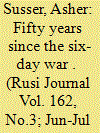

|
|
|
|
|
| Summary/Abstract |
The war of June 1967 was a watershed for the Middle East. In just six days, Israel inflicted upon the Arabs their most humiliating defeat in modern times, perhaps of all time. The great promise of revolutionary Arab nationalism, as espoused by Egypt’s charismatic president, Gamal Abdel Nasser, proved to be no more than an illusion. In this article, Asher Susser explores the lasting consequences of war, arguing that the Arabs have yet to fully recover, 50 years later.
|
|
|
|
|
|
|
|
|
|
|
|
|
|
|
|
| 2 |
ID:
048366
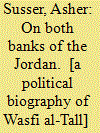

|
|
|
|
|
| Publication |
London, Frank Cass, 1994.
|
| Description |
x, 208p.Hbk
|
| Standard Number |
0714645427
|
|
|
|
|
|
|
|
|
|
|
|
Copies: C:1/I:0,R:0,Q:0
Circulation
| Accession# | Call# | Current Location | Status | Policy | Location |
| 041593 | 923.25695/SUS 041593 | Main | On Shelf | General | |
|
|
|
|
| 3 |
ID:
163248
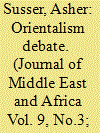

|
|
|
|
|
| Summary/Abstract |
Bernard Lewis, unquestionably the greatest Middle East historian of our times, had clear conceptions of the region and the peoples that were the focus of his decades of scholarship. He believed that to “understand anything at all about what is happening in the Muslim world … there are two essential points which need to be grasped. One is the universality of religion as a factor in the lives of the Muslim peoples, and the other is its centrality.” Lewis, however, had fierce opponents to his views on this centrality of Islam. Chief among them was Edward Said who refused to accept the “notion that there are geographical spaces with indigenous, radically ‘different’ inhabitants who can be defined on the basis of some religion, culture, or racial essence proper to that geographical space.” In the Saidian worldview, the idea that the “Other” was indeed different, was disqualified as politically incorrect and unacceptable. To argue in the name of a Middle Eastern “Otherness” was “essentialist,” “Orientalist,” or even “racist.” Among Western scholars a deeply ingrained reticence evolved to recognize the Otherness of this Middle Eastern Other. Otherness became all too easily conflated with racism and, thus, illegitimate by definition. The penetration of this “Saidism” into academe and the media, of this reluctance to recognize the Otherness of the Other, has led, perhaps more than any other single factor, to the misunderstanding and misinterpretation of the contemporary Middle East.
|
|
|
|
|
|
|
|
|
|
|
|
|
|
|
|
| 4 |
ID:
089581
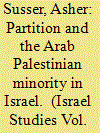

|
|
|
|
|
| Publication |
2009.
|
| Summary/Abstract |
In 1937, the Zionist movement was equally divided over the British proposal to partition Mandatory Palestine as enunciated in the Peel Commission report. By 1945, the enormity of the ravages of the Shoah produced a new realism. Thus, the urgency of the survivors in post-war Europe induced a change of mind. Figures such as Golda Meir and Eleanor Roosevelt now supported partition. Majorities for partition emerged in Zionist parties such as Hapoel Hamizrahi, which had adamantly opposed it previously. The Soviet Union's backing for a Jewish state, following Gromyko's UN speech, brought the Palestine Communist Party into line and persuaded Hashomer Hatzair to abandon its embrace of a bi-national state. By the UN vote on 29 November 1947, only the Revisionists, the Irgun and Lehi, still adhered to their former positions and opposed partition. Amongst the Zionist leadership, the schism was more a tactical division than an ideological one. Nahum Goldmann's speech in July 1946 in which he proclaimed that the three choices-trusteeship, bi-nationalism, and partition-had now been reduced to one, brought these differences to the surface. He argued that there were now simply not enough European Jews to create a Jewish majority in a non-partitioned state. Abba Hillel Silver opposed this approach, claiming that a maximalist pitch was necessary since the British would whittle down even minimalist borders. By the summer of 1947 with the UNSCOP recommendations, even Silver had accepted the inevitability of partition.
|
|
|
|
|
|
|
|
|
|
|
|
|
|
|
|
| 5 |
ID:
178536
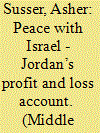

|
|
|
|
|
| Summary/Abstract |
Jordan had various expectations when it initially signed the peace treaty with Israel. The Jordanians believed that the peace with Israel, coming after the Oslo Accords, would pave the way for a strategic understanding with Israel on the establishment of a Palestinian state in the West Bank (including Arab Jerusalem) and Gaza. Such an understanding, they believed, would finally rid them of the nightmare of the ‘alternative homeland’ scenario, that ‘Jordan is Palestine’. Secondly the Jordanians assumed that the economic ‘fruits of peace’ with Israel would extricate Jordan from its perennial economic woes. Jordan would be both secure and prosperous. None of these assumptions actually materialized. The Jordanians are, therefore, profoundly disappointed by the treaty and its real results. They are as fearful as ever of the ‘alternative homeland’ scenario, and they are still suffering, as always, from an economy perpetually on the brink.
|
|
|
|
|
|
|
|
|
|
|
|
|
|
|
|
|
|
|
|
|